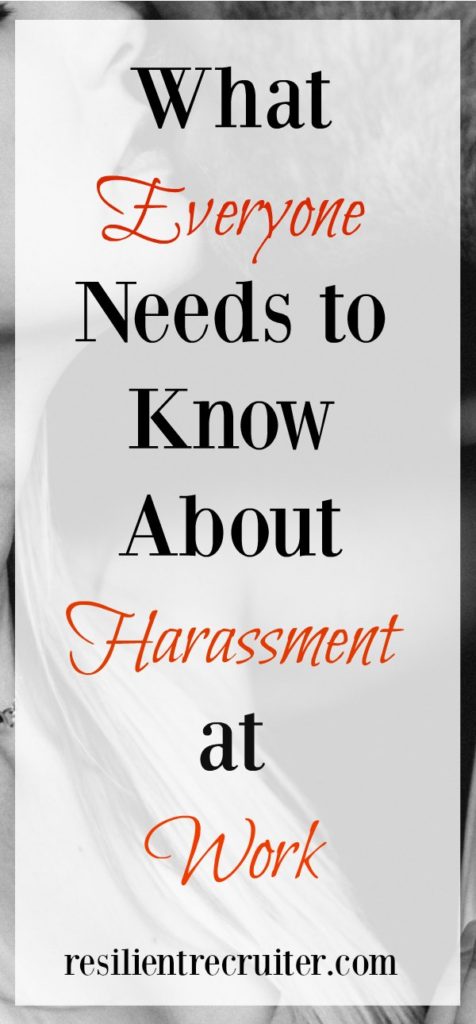Sexual harassment has been a hot topic in the media for the last couple of years, really coming front and center with the notoriety of some of the more recent victims (and perpetrators). The fact that harassment occurs in the workplace (even with celebrities) has brought the subject major attention across the country and beyond. What had been a taboo subject that had been swept under rugs and whispered about in break rooms is being openly described in public letters and Twitter rants.
And from what recent history has taught us – no one is immune.
So What IS Harassment?
According to Jennifer Corso, an employment attorney and partner at Petronzio Schneier Co. in Cleveland, Ohio, the legal definition of harassment is not necessarily what is used for disciplinary purposes in the workplace.
As Ms. Corso explains, from a legal standpoint, sexual harassment generally falls into two categories – quid pro quo (requiring sexual favors in return for favorable treatment) or hostile work environment, where unwelcome sexual advances, requests for sexual favors, and/or other verbal, physical, or visual conduct of a sexual nature is so severe and pervasive that it interferes with an employee’s ability to do their job.
Harassment isn’t limited to sex – unlawful harassment can also be based on other protected class status, that is conduct that defames or shows hostility toward an individual or group due to race, color, religion, sex, gender, national origin, age, or disability, or other classification protected by law.
Harassment can take on many forms, as cited in some of the following examples:
|
|
|
|
|
|
A Different Bar for Policy Purposes
Ms. Corso notes that in general, there is a high bar for meeting the legal “hostile work environment” standard, and while one-off or infrequent comments will generally not meet this standard, they can still be the basis for employee discipline and even termination. “Employers are not bound by the legal definition of harassment to enforce their internal policies.”
Ms. Corso advises, “Employers should have knowledge of the legal standards, but should be primarily concerned about having internal policies that prevent harassment or discrimination from occurring in the first place, and have reliable reporting, investigation and resolution procedures in place if a complaint does arise.”
How Should a Company Respond to a Harassment Claim?
1. Take Action to Prevent Claims
Every employer should have a good anti-harassment & discrimination policy, and the policy should have multiple channels for reporting violations. All employees should be trained on the policy, and supervisors/managers should receive extra training on how to prevent harassment & discrimination and how to respond to complaints. Anyone who could be involved in an investigation should also be trained on proper investigation methods. Most importantly, create and foster an environment in which employees feel comfortable reporting complaints without fear of retaliation.
2. Investigate and Take Action (if warranted)
According to Jennifer Corso, an employer’s legal responsibility is to take “prompt and effective” action when informed of a harassment or discrimination complaint. And, as Ms. Corso says, “prompt means prompt. We’re talking within a day or two, at the most, unless there’s a really unusual circumstance.” Gather statements from everyone involved. Separate the employees, if necessary (and if possible). Come to a conclusion based on the weight of the evidence. If a policy violation occurred, take “effective” action. Termination isn’t always necessary, but any discipline should be weighty enough to deter future misconduct. Suspensions, demotions, and/or training can be effective tools. Document everything.
3. But it’s He Said She Said!
Sometimes this happens – there are no corroborating witnesses or evidence, and there is no reason to believe or disbelieve one employee over the other. In these cases, document your findings and your reasons for not deciding one way or the other. Usually it is appropriate to inform both parties that you’re at a stalemate, but HR should keep their eyes and ears open for future issues.
4. Guard Against Retaliation
Ms. Corso also cautions employers to be on the lookout for any possible retaliation against the employee who made the complaint or supporting witnesses. Retaliation can be grounds for a lawsuit on its own. Caution all employees against retaliatory actions, and counsel everyone involved to report any problems.
What Should an Employee Do?
Check Your Company Policies and/or Employee Handbook
Most employee handbooks have a harassment section, where there may be specific protocols laid out for reporting harassment. If you don’t see any specific steps that need to be followed, start with your direct supervisor or your Human Resource department. If this isn’t possible, speak with any person in management you feel comfortable reporting your case to, and ask them to take the matter to the appropriate company leader.
Help HR Help You
First, report misconduct promptly. It is very hard to investigate claims that are weeks or months old. The company will want to investigate, so help them out by providing as much detail as possible. What time was it? Exactly where did it take place? What was the context of the conversation or activity that brought about the comment or behavior? If there were other people there, or in ear shot, make sure you list those details as well. Since this may be your word against the offender’s, the more information you can provide to support your claim, the better.
Do Your Job
Harassment itself is emotional but working in an environment where a harassment claim is taking place can put everyone on edge. Be sure you are doing your job to the best of your abilities and try not to let the distraction of an investigation or case distract you from your duties. If any co-workers are bothering you about your claim, or accuse of you getting someone “in trouble”, report it to HR immediately.
by Natalie Lemons
Natalie Lemons is the Founder and President of Resilience Group, LLC, and The Resilient Recruiter and Co-Founder of Need a New Gig. She specializes in the area of Executive Search and services a diverse group of national and international companies, focusing on mid to upper-level management searches in a variety of industries. For more articles like this, follow her blog. Resilient Recruiter is an Amazon Associate.
Navigate YOUR Career Path!

Get in on our newsletters, FREE products and content to make your job easier!




Well written! Sexual harassment is a tough subject to cover and you did it well.
Thank you so much! Yes – it is definitely a difficult conversation to approach!
Great Article! I’ve actually been in a sexual harassment situation when I was working for a Financial Firm. When I addressed with my boss I was told to just accept it and that was the guy’s personality. It as a small company and I was the only woman working there. I finally stood up for myself in the ned but I should have just recorded and reported the incidents.